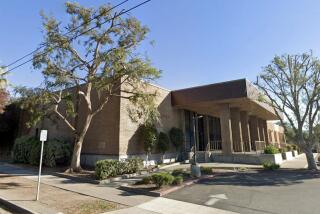D.A. Offers Help in Bouncing Back From Bad Checks : ‘School’ Teaches Small-Timers About Ethics, Budget-Keeping
- Share via
One by one their confessions poured out:
“I bounced two of them--$70 for food and $20 for the phone bill,” said Wayne Adams, 29, of La Puente. “It was January, right after Christmas.”
The man sitting across from Adams committed his offense the day his baby son was baptized.
“It was a $200 check to a liquor store for the baptismal party,” he said in a low voice.
“I thought I had enough money,” said Larry Logsdon, 35, a Glendora vitamin salesman.
But he didn’t.
And neither did any of the other 19 people seated around him. They are all bad-check writers and as punishment for their misdemeanor crimes they have been ordered to spend four hours in Bad Check Writer’s School, the Los Angeles County district attorney’s equivalent of traffic school.
Weekend Class
But instead of the rules of the road, these offenders grapple with the lines of check book ledgers. Every weekend, groups of 20 to 30 meet inside empty bank buildings to learn about the ethics of bad-check writing and the basics of money management.
“You have to learn to take control of your lives and always know how much money you have in your checking account,” instructor Teri Sheya said. “The purpose of this class is to teach you to change your spending habits.”
The class is the concluding requirement of a pilot program in parts of Los Angeles County that also orders check bouncers to repay creditors and fines them $65.
The diversion program, which keeps first-offenders out of the court system, has been so successful--$1.2 million returned to merchants since late 1986--that plans call for it to double in size in November to include the city of Los Angeles, said Capt. Edmund M. Aleks, who heads the program for the district attorney’s special operation division.
The experiment operates in a stretch from Burbank through the San Gabriel Valley to Pomona and in the southeastern county, including Cerritos, Norwalk and Signal Hill.
The program is aimed not at felons who weave sophisticated and fraudulent financial trails, but at people who write bad checks under $200.
Any person who has received a bad check must attempt twice to clear it before filling out a bad-check report and forwarding it to the district attorney’s office.
The six investigators then send out notices to the check writers--generally homemakers, salesmen, laborers and bookkeepers who don’t know how to balance their checkbooks--Aleks said. Some believe that it is all right to “float” a few checks. Others are victims of their subtraction errors.
“It’s dumb mistakes that brings most of us here today,” Logsdon, who wrote a $75 bad supermarket check. “I know I’ve been kicking myself ever since.”
More than 5,000 people have completed the class and received a faux-parchment certificate, one diploma that “most people don’t hang on their wall,” said Sheya, one of the finance professionals hired by the district attorney to teach the course.
At one recent class, 20 students gathered at 9 a.m. outside the doors of the Mercury Savings Bank in West Covina. Most leaned against the rail with downcast eyes and folded arms until the teachers opened the doors.
“It was the bank’s fault,” grumbled Cynthia Daniels, 37, of West Covina. “I don’t feel the least bit guilty about this. I’m going to chalk this morning up for experience.”
Dose of Cheer
“It’s embarrassing to be here,” said another woman who did not want her name published.
Sheya, dressed in a tailored pink suit, attempted to inject a dose of morning cheer into her students, most of whom wore sweats.
“Well, we’re going to have some fun today, right?” she asked. No response. So, she began the class with a warning: Students who skip out early and don’t complete the course risk arrest and prosecution.
The students perked up, though, and several shouted “no” when Sheya asked whether a bad-check writer is the same as a thief.
“If you make good on the check and pay the late charges, who gets hurt?” one man commented.
According to California law, Sheya explained, anyone who writes a check without enough money to cover it with the intent to defraud commits a crime, said Sheya, a corporate security officer for Bank of America.
But Kathy Ward, 33, of West Covina had difficulty admitting that she broke the law.
“I just bought some groceries. How could they get me for buying milk for my children?” Ward asked, adding that she did not believe that a $44.92 bad check to a supermarket would end up with the district attorney. So she said she ignored the first notice.
“But that second letter scared me,” she said. “I figured I better take care of it before the police come . . . to get me.”
Instructor Christine Daniels, a former Security Pacific Bank branch manager, said students need to “take control of their money” and stop playing “float roulette,” the habit of writing a bad check and depositing the funds to cover it later.
To graduate from bad-check writer’s school, students must balance a bank statement and a checkbook register printed in their workbook.
This was a first for Doug Duncan, 35, a West Covina floor layer who wrote three bad checks totaling $96 against a $5,000 New York state check he deposited into his account. “I didn’t know the bank puts holds on out-of-state checks,” he explained. But even if the large check had cleared, Duncan still would have not known his checking account balance.
“When I get the statement I throw it up on the dashboard,” Duncan said. “I don’t even balance it--too confusing. It’s not balanced now.”
After showing his balanced register, Wayne Adams collected his diploma and said he decided to get bad checks out of his life the easy way.
“I just gave up. I threw the checkbook away,” he said. “Now it’s cash and carry.”
More to Read
Sign up for Essential California
The most important California stories and recommendations in your inbox every morning.
You may occasionally receive promotional content from the Los Angeles Times.










